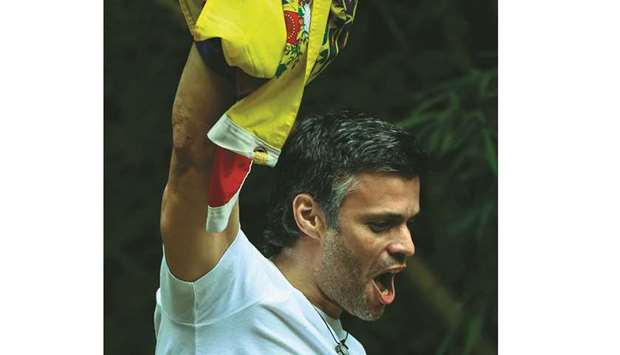Venezuela’s most prominent political prisoner, Leopoldo Lopez, pumped his fist and waved a national flag yesterday in a triumphant public appearance after he was released from prison and placed under house arrest.
The 46-year-old politician was all smiles as he emerged in the garden of his house and greeted dozens of supporters with the words “Yes, we can!”
Lopez was released amid intensifying pressure on the embattled leftist government of Nicolas Maduro.
“Leopoldo Lopez is at his home in Caracas with (wife) Lilian and his children,” Lopez’s Spanish lawyer Javier Cremades said in Madrid. “He is not yet free but under house arrest. He was released at dawn.”
Lopez, leader of the Voluntad Popular (Popular Will) party and a symbol of resistance to the Maduro government, had been held for three and a half years at a military prison for allegedly “inciting violence” by calling for anti-government protests.
His release has been a key demand of Venezuela’s opposition and the international community, amid an intensifying political confrontation aimed at forcing the unpopular Maduro to hold early elections.
Spanish Prime Minister Mariano Rajoy, speaking from the G20 summit in Hamburg, Germany, said he and the leaders of Argentina, Brazil and Mexico were calling for “the liberation of all the political prisoners and for the organisation of free and democratic elections.”
Cremades underscored that “all of Leopoldo Lopez’s civil and political rights must still be restored.”
“What’s more, there are still 300 political prisoners in the Bolivarian jails,” he added.
Foro Penal, an NGO, puts the number of political prisoners in Venezuela at 433.
The government insists they are in jail for acts of violence.
The Supreme Court on its Twitter account cited “health reasons” for the order moving Lopez to house arrest, which was signed on Friday by court president Maikel Moreno.
It said the action was “a humanitarian measure in keeping with the law.”
On Friday night, Lopez’s wife spent an hour visiting her husband in his cell at Ramo Verde prison just outside Caracas.
Tintori, who has made the release of her husband and other political prisoners an international cause, did not comment after the latest move, and details on Lopez’s health were not immediately forthcoming.
The former mayor of a Caracas municipality, Lopez, 46, was an early champion of street protests to force political change in Venezuela as the oil-rich country spiralled into a severe economic and political crisis after the death of Maduro’s predecessor, Hugo Chavez.
The government blamed Lopez for a months-long outbreak of anti-government protests in 2014 that left 43 people dead in clashes with security forces.
He was sentenced to nearly 14 years in prison on charges that his defence said were politically motivated and based on “manipulated” evidence.
At least 91 people have died since April 1 in fresh clashes between protesters and security forces over moves by the courts and the government to strip the National Assembly of power, delay elections and rewrite the constitution.
On Wednesday, pro-government militants wielding sticks and pipes stormed the grounds of the opposition-held National Assembly and beat lawmakers, injuring at least five at the only state institution that the opposition nominally controls.
Maduro condemned the violence and said he had ordered an investigation.
Cremades said the latest development “indicates how desperate and divided they are, it’s a demonstration of the weakness of a cornered regime.”
Fellow opposition leaders celebrated Lopez’s release from prison, but insisted more needed to be done.
“It gives us great happiness that Leopoldo Lopez is at home with his family.
He must be given his full liberty together with all political prisoners,” Henrique Capriles, a former opposition presidential candidate, said.
Henry Ramos Allup, an opposition deputy and former head of the National Assembly, said house arrest “must be an advance toward full liberty.”
Two other prominent opposition leaders jailed by the government on similar charges have since been moved to house arrest - Caracas mayor Antonio Ledezma and the former mayor of the western city of San Cristobal Daniel Ceballos.
Late last year the government released some lesser-known detained activists at the behest of the Vatican.
While in prison, Lopez was visited on several occasions by former Spanish prime minister Jose Luis Rodriguez Zapatero, most recently on June 4 accompanied by then Venezuelan foreign minister Delcy Rodriguez and her brother, ruling party politician Jorge Rodriguez.
On that occasion, Lopez called on Venezuelans to continue protesting in the streets.
His wife denied that the meeting was to negotiate his house arrest in return for a defusing of the protests.

Venezuelan opposition leader Leopoldo Lopez displays a Venezuelan national flag as he greets supporters gathering outside his house in Caracas, after he was released from prison and placed under house arrest for health reasons yesterday.
